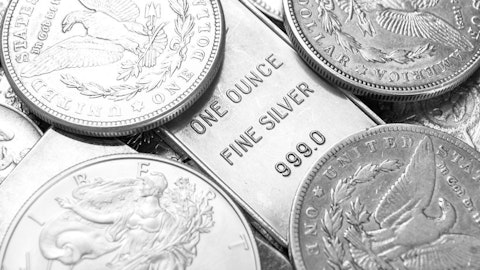2. Nucor Corporation (NYSE:NUE)
Number of Hedge Fund Holders: 25
Nucor Corporation (NYSE:NUE) makes and sells steel products. It is one of the largest steel firms in the world and the stock has gained over 114% in the past year as investors pile into the stock in hopes of shielding themselves from the volatility associated with growth equities in a high interest rates environment. Nucor Corporation (NYSE:NUE) has paid a growing dividend to shareholders for close to five straight decades.
Nucor Corporation (NYSE:NUE) is one of the favorite hedge funds stocks in the precious metals world. At the end of the third quarter of 2021, 25 hedge funds in the database of Insider Monkey held stakes worth $199 million in Nucor Corporation (NYSE:NUE), compared to 32 in the preceding quarter worth $196 million.
In its Q1 2021 investor letter, Madison Funds, an asset management firm, highlighted a few stocks and Nucor Corporation (NYSE:NUE) was one of them. Here is what the fund said:
“This quarter we are highlighting Nucor (NUE) as a relative yield example within the Materials sector. NUE is a leading manufacturer of steel and steel products. It is the largest steelmaker in the U.S. based on production volume with a vertically integrated business model. The company has a low fixed-cost position due to its use of electric arc furnaces, which are cleaner, less labor and energy-intensive than blast furnaces, and this results in low total costs per unit of steel produced. Our view is that a low cost position is an important attribute in a commodity business. NUE’s historical financial record supports this view as it has been profitable every year except for one over the past fifty years, unlike many steel producing peers. In addition, the company has a diverse product and mill portfolio that takes market share over time. We believe its scale, low fixed-cost position, consistent record of profitability and diverse mill portfolio result in a sustainable competitive advantage versus peers.
Our thesis on NUE is that it should benefit from higher steel prices as the U.S. economy recovers from the downturn caused by the Covid-19 pandemic. The company may also be a beneficiary of on-shoring, where manufacturing returns to the United States. These two dynamics should drive growth this year, and if the United States Congress passes new infrastructure legislation, that will provide another avenue for growth longer-term.
Importantly, NUE has a strong balance sheet and flexible capital spending model that can quickly adjust to changing economic conditions. If economic growth slows, NUE can quickly reduce its cost structure, something it has done successfully in prior cyclical downturns. The company has low financial leverage as its net debt/adjusted earnings before interest, taxes, depreciation and amortization (EBITDA) was only 0.9x at the end of last year, and it consistently generates positive free cash flow. These favorable characteristics differentiate NUE from other steel producers and help the company gain market share through disciplined capital allocation.
The fund purchased NUE at $56 in January, 2021, after it reached a low valuation with an attractive dividend yield and relative dividend yield versus the S&P 500. At the time or purchase, the stock yielded 3.3% and had a relative dividend yield of more than 2x the S&P 500, which was the high end of its historical range as shown in the bottom pane in the graph. The company is also a Dividend Aristocrat that has raised its dividend annually for 48 years. We expect continued dividend increases going forward.
Risks to the thesis include a prolonged economic downturn, lower steel prices and increasing steel import volumes that could hurt NUE financial performance. We believe these risks are manageable as economic growth is expected to be well above average this year. Specifically, Goldman Sachs is forecasting U.S. gross domestic product (GDP) growth of +8% in 2021, which would be the fastest pace of growth since 1950. Strong growth is likely to result in higher manufacturing activity, which we believe would be supportive of higher steel prices and limit risks to the thesis.”





